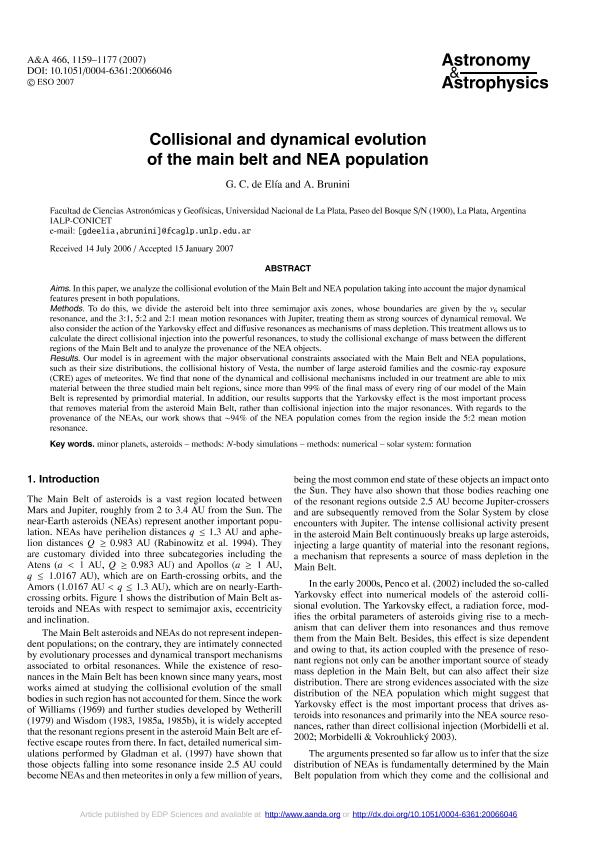Mostrar el registro sencillo del ítem
dc.contributor.author
de Elia, Gonzalo Carlos

dc.contributor.author
Brunini, Adrian

dc.date.available
2018-08-07T14:17:43Z
dc.date.issued
2007-05
dc.identifier.citation
de Elia, Gonzalo Carlos; Brunini, Adrian; Collisional and dynamical evolution of the main belt and NEA population; EDP Sciences; Astronomy and Astrophysics; 466; 3; 5-2007; 1159-1177
dc.identifier.issn
0004-6361
dc.identifier.uri
http://hdl.handle.net/11336/54390
dc.description.abstract
Aims. In this paper, we analyze the collisional evolution of the Main Belt and NEA population taking into account the major dynamical features present in both populations. Methods. To do this, we divide the asteroid belt into three semimajor axis zones, whose boundaries are given by the V6, secular resonance, and the 3:1, 5:2 and 2:1 mean motion resonances with Jupiter, treating them as strong sources of dynamical removal. We also consider the action of the Yarkovsky effect and diffusive resonances as mechanisms of mass depletion. This treatment allows us to calculate the direct collisional injection into the powerful resonances, to study the collisional exchange of mass between the different regions of the Main Belt and to analyze the provenance of the NEA objects. Results. Our model is in agreement with the major observational constraints associated with the Main Belt and NEA populations, such as their size distributions, the collisional history of Vesta, the number of large asteroid families and the cosmic-ray exposure (CRE) ages of meteorites. We find that none of the dynamical and collisional mechanisms included in our treatment are able to mix material between the three studied main belt regions, since more than 99% of the final mass of every ring of our model of the Main Belt is represented by primordial material. In addition, our results supports that the Yarkovsky effect is the most important process that removes material from the asteroid Main Belt, rather than collisional injection into the major resonances. With regards to the provenance of the NEAs, our work shows that ∼94% of the NEA population comes from the region inside the 5:2 mean motion resonance. © ESO 2007.
dc.format
application/pdf
dc.language.iso
eng
dc.publisher
EDP Sciences

dc.rights
info:eu-repo/semantics/openAccess
dc.rights.uri
https://creativecommons.org/licenses/by-nc-sa/2.5/ar/
dc.subject
Methods: N-Body Simulations
dc.subject
Methods: Numerical
dc.subject
Minor Planets, Asteroids
dc.subject
Solar System: Formation
dc.subject.classification
Astronomía

dc.subject.classification
Ciencias Físicas

dc.subject.classification
CIENCIAS NATURALES Y EXACTAS

dc.title
Collisional and dynamical evolution of the main belt and NEA population
dc.type
info:eu-repo/semantics/article
dc.type
info:ar-repo/semantics/artículo
dc.type
info:eu-repo/semantics/publishedVersion
dc.date.updated
2018-07-11T14:19:20Z
dc.journal.volume
466
dc.journal.number
3
dc.journal.pagination
1159-1177
dc.journal.pais
Francia

dc.journal.ciudad
Les Ulis
dc.description.fil
Fil: de Elia, Gonzalo Carlos. Consejo Nacional de Investigaciones Científicas y Técnicas. Centro Científico Tecnológico Conicet - La Plata. Instituto de Astrofísica La Plata. Universidad Nacional de La Plata. Facultad de Ciencias Astronómicas y Geofísicas. Instituto de Astrofísica La Plata; Argentina. Universidad Nacional de La Plata. Facultad de Ciencias Astronómicas y Geofísicas; Argentina
dc.description.fil
Fil: Brunini, Adrian. Consejo Nacional de Investigaciones Científicas y Técnicas. Centro Científico Tecnológico Conicet - La Plata. Instituto de Astrofísica La Plata. Universidad Nacional de La Plata. Facultad de Ciencias Astronómicas y Geofísicas. Instituto de Astrofísica La Plata; Argentina. Universidad Nacional de La Plata. Facultad de Ciencias Astronómicas y Geofísicas; Argentina
dc.journal.title
Astronomy and Astrophysics

dc.relation.alternativeid
info:eu-repo/semantics/altIdentifier/doi/https://dx.doi.org/10.1051/0004-6361:20066046
dc.relation.alternativeid
info:eu-repo/semantics/altIdentifier/url/https://www.aanda.org/articles/aa/abs/2007/18/aa6046-06/aa6046-06.html
Archivos asociados
